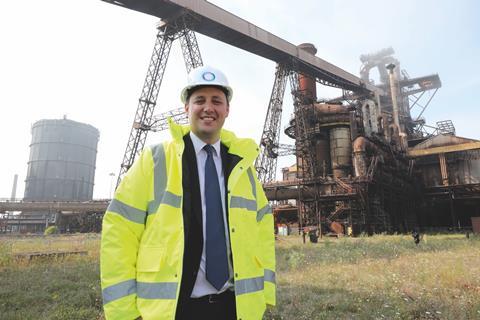Three new metro-mayoral positions will be among those filled as local and regional elections take place next month. Carl Brown reports.

Source:
The elections on 2 May will include a combination of local and regional elections

The outcome of next month’s local and regional elections could have a major bearing on decisions for the built environment, with candidates fighting for the right to use varying levels of devolved decision-making powers over planning and investment.
In all, 107 local authorities across England will hold elections on 2 May, while all 25 London Assembly seats are also up for grabs. For the built environment, though, most eyes will be on the battle for 10 metro mayoral positions, three of which are newly created.
Due in part to Labour’s strong position in the national opinion polls for Westminster, it is widely expected that the five incumbent Labour metro mayors will be re-elected. These are Sadiq Khan in London, Andy Burnham in Greater Manchester, Steve Rotheram in Liverpool, Tracy Brabin in West Yorkshire and Oliver Coppard in South Yorkshire.
>> See also: Local elections 2024: London mayor Sadiq Khan’s record on the built environment
However, there are several other mayoral positions where the outcome is less certain.
So, what are the key battlegrounds and what have the major candidates said about transport infrastructure, planning and housing?
Key battlegrounds
Tees Valley
Perhaps the most interesting battle lies in the North-east. Ben Houchen, the one-time immensely popular poster boy for levelling-up, is facing a fierce battle to hold on to the mayoralty in the Tees Valley.

Houchen won 73% of the vote in 2021 as he pledged to use devolution powers to place his region at the centre of the UK’s net zero revolution.
Buoyed by the Conservative’s “red wall” gains under Boris Johnson, Houchen eyed a dramatic turnaround for an area that was hit hard by the closure of the Redcar steelworks in 2015, with the loss of 2,000 jobs. Houchen launched a plan, through his South Tees Development Corporation, to transform the 4,500-acre steelworks site into one of Europe’s largest brownfield remediation sites along with a freeport to create a tax-free zone for shipping.
Under Houchen’s watch Teesside has also been selected as one of two carbon capture clusters in the UK, while in January he outlined a £1bn package for transport improvements in the region. However, three years on from his resounding re-election, things are not looking quite so rosy for Houchen.
A recent poll of Tees Valley voters, conducted by research firm Censuswide, found just 19% intend to vote for Houchen with just under half (45%) saying they would vote for Labour candidate Chris McEwan.
So what has changed? Houchen’s mayoralty has arguably been tarnished by the controversy surrounding allegations relating to the Teesworks project.
In May 2023 levelling up secretary Michael Gove announced an independent review into allegations brought by Labour MP Andy McDonald relating to the financing of the joint venture delivering the Teesworks regeneration project.
The review subsequently found no evidence of corruption, wrongdoing or illegality, but described a culture of excessive confidentiality and a lack of transparency relating to the project. Labour has called for a further review by the National Audit Office.
Houchen is also battling in the face of an expected huge swing back to Labour in the so-called “red wall” seats. Notably nearly every constituent council in the Tees Valley region is Labour-held.
Houchen is up against McEwan, the deputy leader of Darlington council. McEwan has pledged to invest £2bn in public transport as a centrepiece of his campaign.
West Midlands
Another high-profile Conservative mayor faring badly in the latest polls is boss Andy Street, who is seeking re-election in the West Midlands. Like Houchen in Tees Valley, the former M&S boss is aiming to win a third term as mayor. However, a poll published on 16 April by research firm Redfield & Wilton Strategies showed Street trailing his rival, Labour’s Richard Parker, by 14 points.

Street has hit the headlines in recent months for his criticism of the government’s decision to scrap the remaining northern leg of the HS2 railway line from Birmingham to Manchester, with suggestions at one stage that he might even resign over the issue. Instead he stayed in post and has been instrumental, along with Greater Manchester mayor Andy Burnham, in working with a private sector consortium including Arup, Mace and Arcadis, led by former chair of HS2 Sir David Higgins, to put forward alternatives.
Street last week published his manifesto, which had a big emphasis on social housing, pledging to use new devolution powers funding to “triple the number of social homes” built by housing associations in the region through the affordable homes programme.
The incumbent mayor also promised to continue his “brownfield first” approach, to work with local councils to bolster planning departments and commission an expert review into the West Midlands Combined Authority’s housing powers, including examining whether it ought to be given independent compulsory purchase powers.
No doubt mindful of the potential of the national swing hitting his vote, Street has sought to distance himself from the national party. He refrained from using the Conservative party logo at his launch event and has been using green and purple in his campaign materials instead of his party’s blue.
Street’s manifesto also promised to “double down” on investment in construction skills training, particularly for young people. He promised new courses and training hubs and to “develop and support specialist construction skills such as restoration and heritage buildings, to support our efforts to preserve and enhance the region’s historically significant buildings”.
Skills would appear to be a major issue in the election, with Labour’s candidate, accountant Richard Parker, pledging to create 150,000 jobs in the region by using the mayor’s skills budget to help businesses align with colleges and universities.
In November, Parker visited a modular housing factory owned by a subsidiary of GreenSquare Accord and pledged to “support production capacity in the sector so we can build the affordable and social housing the region so desperately needs”.
North East
The newly created North East Mayoral Combined Authority, which combines seven local authorities, will hold its first mayoral election on 2 May. Given five of the seven councils are Labour-led, it would be tempting to assume Labour candidate Kim McGuinness is a shoo-in.
McGuinness, who is a Northumbria Police crime commissioner and cabinet member at Newcastle City Council, has pledged to invest in transport infrastructure if elected and to boost affordable housebuilding to tackle the 40,000-strong waiting list in the area.
She said in her manifesto: “I’ll support our councils to make sure the land required is ready and available and we are able to deliver the next generation of affordable and social housing because more people should have access to a great social home.”
She said she would develop a regional spatial plan to map needed “housing, transport links, job creation opportunities and green space”.
However, Jamie Driscoll, the current mayor of North Tyne (a position which will be folded into the new, wider mayoral role) is standing as an independent and is hopeful of springing an upset.
Driscoll, an engineer by trade, was barred from Labour’s selection process for the North East mayoral candidacy and subsequently resigned from the Labour Party in protest.
Baroness Chapman, the Labour MP for Darlington and a Keir Starmer ally, defended the decision, saying Driscoll did not meet the “high bar for selection”. The decision was linked to Driscoll’s appearance on stage with film director Ken Loach, who was expelled from Labour in 2021 following a row over antisemitism.
Driscoll has pledged to create a public sector land commission if elected to make more land available for social rented housing along with a selective licensing scheme to improve standards in the private rented sector. He has also spoken about using new transport powers to create new metro lines.
The Conservative candidate, Guy Renner-Thompson, is not fancied to win the mayoralty, but it should be noted that he runs a construction business. Renner-Thompson is pledging to set up a new development corporation to regenerate industrial areas and bring in a small business grant scheme.
East Midlands
Another region electing its first metro mayor is the East Midlands. The new combined authority, which launched last month, includes upper-tier councils in Derbyshire and Nottinghamshire although Leicester city and Leicestershire county councils declined to join.
The bookies favourite to win is Labour candidate Claire Ward, who has put an emphasis on housing delivery, particularly on brownfield land. Ward wants to use mayoral powers to insist on high energy efficiency standards in new homes. She has also pledged to support green energy industries in the region including hydrogen, nuclear and fusion.
The Conservative candidate is Ben Bradley, the MP for Mansfield and leader of Nottinghamshire County Council. Bradley, who heads up the Blue Collar Conservatives group of “working-class” Conservatives, has pledged to improve public transport in part by using a new £1.5bn transport fund which the combined authority will receive.
He says he will “use new capital funding to deliver transport projects that have been promised for many years, including restoring railway provision and delivering new road improvements and bypasses”.
Bradley is also emphasising a pro-business outlook, pledging to “work with private sector investors to sort out derelict town centre buildings and bring them back in to use, helping to modernise the high street with new leisure services and residential properties to help support the shops.”
Full list of mayoral elections
Voters in England will choose 10 metro mayors, with the North East, York and North Yorkshire, and the East Midlands electing them for the first time. The following will be going to the polls on 2 May:
York and North Yorkshire
East Midlands
West Midlands
North East.
Greater Manchester
Tees Valley
Liverpool City Region
London
South Yorkshire
West Yorkshire
London
Election Focus

As thoughts turn towards the next general election, the UK is facing some serious problems.
Low growth, flatlining productivity, question marks over net zero funding and capability, skills shortages and a worsening housing crisis all amount to a daunting in-tray for the next government.
This year’s general election therefore has very high stakes for the built environment and the economy as a whole.
For this reason, ��ɫ����TV is launching its most in-depth election coverage yet, helping the industry to understand the issues in play and helping to amplify construction’s voice so that the government hears it loud and clear.
��ɫ����TV is investigating the funding gaps facing the next government’s public sector building programmes and looking at the policy options available to the political parties.
In the coming months our ��ɫ����TV Talks podcast will focus on perhaps the hottest political topic: the housing crisis. The podcast will feature interviews with industry leaders who side-step soundbites in favour of in-depth discussions.
As the main parties ramp up their policy announcements, we will keep you up to date with their latest pledges on our website through our “policy tracker”.


























No comments yet